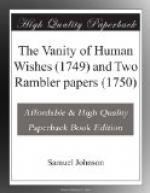Very early in The Rambler Johnson remarks characteristically that “men more frequently require to be reminded than informed.” He believed this, and his generation believed it, because they thought that human nature changed little from age to age. The problems of conduct that confront the living individual have been faced countless times by his predecessors, and the accumulated experience of mankind has arrived at conclusions which in the main are just and therefore helpful to-day. The most important truths are those which have been known for a very long time. For that very reason they tend to be ignored or slighted unless they are restated in such a way as to arrest attention while they compel assent. Hence the best writing is that which most successfully resolves the paradox of combining the sharpest surprise with the widest recognition. Such an ideal is so difficult of attainment that, inevitably, many who subscribed to it succeeded only in unleavened platitude and others rejected it for the easier goal of novelty.
In this most difficult class The Vanity of Human Wishes has won a respectable place. It is freighted with a double cargo, the wisdom of two great civilizations, pagan and Christian. Although based upon Juvenal’s tenth Satire, it is so free a paraphrase as to be an original poem. The English reader who sets it against Dryden’s closer version will sense immediately its greater weight. It is informed with Johnson’s own sombre and most deeply rooted emotional responses to the meaning of experience. These, although emanating from a devout practising Christian and certainly not inconsistent with Christianity, neither reflect the specific articles of Christian doctrine nor are lightened by the happiness of Christian faith: they are strongly infused with classical resignation.
The poem is difficult as well as weighty. At times its expression is so condensed that the meaning must be wrestled for. Statements so packed as, for example,
Fate wings with ev’ry wish th’
afflictive dart,
Each gift of nature, and each grace of
art,
do not yield their full intention to the running reader. One line, indeed,—the eighth from the end (361)—has perhaps never been satisfactorily explained by any commentator. (The eighteenth paragraph of Johnson’s first sermon might go far to clarify it.) But such difficulties are worth the effort they demand, because there is always a rational and unesoteric solution to be gained.
The work as a whole has form, is shapely, even dramatic; but it is discontinuous and episodic in its conduct, and is most memorable in its separate parts. No one can forget the magnificent “set pieces” of Wolsey and Charles XII; but hardly less noteworthy are the two parallel invocations interspersed, the one addressed to the young scholar, the other to young beauties “of rosy lips and radiant eyes",—superb admonitions both, each containing such felicities of




